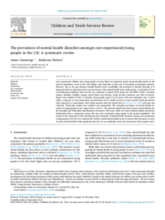Care-experienced children and young people are more likely to experience poorer mental health relative to the general population. Some of the most highly cited literature in this area is becoming increasingly outdated, however, and as the gap between mental health service availability and provision is steadily growing, it is imperative that we understand the scale and nature of the mental health needs of this group. A systematic review of all literature published from the UK was conducted in March 2022 using APA PsycINFO, ASSIA, Cochrane Library, Medline, PubMed, Scopus, Social Policy and Practice, Social Services Abstracts, and Web of Science. Papers were included if they 1) sampled young people (aged 0 to 18 years) with care experience and, 2) used either a standard or non-standardised measurement tool, or health records to assess mental health prevalence rates (reported as a percentage). Risk of bias assessed used the QuADS tool and data was extracted. Thirty-nine studies were included and summarised. The estimated prevalence of mental health disorders of young people in care ranged from 1 to 82 %.
The most frequently used tool to assess mental health was the Strengths and Difficulties Questionnaire (Goodman, 1997) and, while over half of studies utilised prevalence information from a comparator group, this was most commonly young people in the general population. The results of the systematic review demonstrate that estimates of mental health disorders among care-experienced young people in the UK vary considerably. Further consideration should be given toward what measures are used to assess mental health in this population and how we can optimally assess and characterise their support needs.

